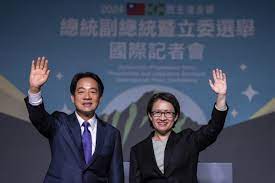Manas Dasgupta
NEW DELHI, Jan 13: The Taiwanese voters swept the ruling Democratic Progressive Party’s (DPP) presidential candidate Lai Ching-te, branded a threat to peace by China, into power on Saturday, strongly rejecting Chinese pressure to spurn him, as Lai pledged both to stand up to Beijing and seek talks.
A vote closely watched from Beijing to Washington, Mr Lai delivered an unprecedented third consecutive term for the DPP after a raucous campaign in which he pitched himself as the defender of Taiwan’s democratic way of life. Communist China claims democratic Taiwan, separated from the mainland by a 180-kilometre strait, as its own and says it will not rule out using force to bring about “unification,” even if conflict does not appear imminent.
Beijing has in the past slammed Mr Lai, the current vice president, as a dangerous “separatist” and on the eve of the vote, its defence ministry vowed to “crush” any move towards Taiwanese independence. Lai’s party, which champions Taiwan’s separate identity and rejects China’s territorial claims, was seeking a third successive four-year term, unprecedented under Taiwan’s current electoral system.
“We’ve written a new page for Taiwan’s history of democracy,” Lai, long the frontrunner in the polls, told reporters after both his opponents conceded defeat.
In the run-up to the election, China denounced Lai as a dangerous separatist, and called on the people of Taiwan to make the right choice while noting the “extreme harm of the DPP’s ‘Taiwan independence’ line”. They have also repeatedly rebuffed Lai’s calls for talks. Lai said he would maintain the status quo in cross-strait relations, but that he was “determined to safeguard Taiwan from threats and intimidation from China”.
At the same time, he emphasized the need for cooperation and dialogue with Beijing on an equal basis to “replace confrontation” though he didn’t give specifics. Beijing has yet to comment on Lai’s victory.
The election was not only about China, with electors worried about issues as varied as the high cost of housing, low wage growth and unstable power supplies. Lai won 40% of the vote in Taiwan’s first-past-the-post system, unlike current President Tsai Ing-wen who was re-elected by a landslide four years ago with more than 50% of the vote. Under the Taiwanese constitution, she can not contest the presidential elections for a third term.
Lai offered an olive branch to his opponents in saying he would include talent from their parties. Lai said he would cooperate with his electoral rivals, Hou Yu-ih of Taiwan’s largest opposition party the Kuomintang (KMT), and former Taipei Mayor Ko Wen-je of the Taiwan People’s Party, in resolving the problems Taiwan faces.
During the polls, hundreds of thousands of Taiwanese youths flocked to rallies held by Ko, who has emerged as a new force in Taiwan’s political landscape with roughly a quarter of the vote despite coming last. Mr Lai had 40.2% of the vote with ballots counted from 98% of polling stations, according to official data from Taiwan’s Central Election Commission.
His main rival Hou Yu-ih of the Opposition Kuomintang (KMT) trailed in second place with 33.4% and conceded defeat. “When the people have made their decision, we face them and we listen to the voices of the people,” Mr Hou told supporters. “I congratulate Lai Ching-te and (DPP running mate) Hsiao Bi-khim on getting elected and I hope they will not let down Taiwanese people’s expectations.”
Nearly 20 million people were eligible to vote, and turnout has not yet been announced. The election was watched closely by both Beijing and Washington, Taiwan’s main military partner, as the two superpowers tussle for influence in the strategically vital region. “This is Taiwan’s hard-won democracy. We should all cherish our democracy and vote enthusiastically,” Lai told reporters as he voted earlier in the day in a school gymnasium in the southern city of Tainan.
Lai’s victory extends DPP’s rule after eight years under outgoing President Tsai Ing-wen, who reached Taiwan’s two-term limit. KMT’s Hou argued for warmer ties with China and accused the DPP of antagonising Beijing with its stance that Taiwan is “already independent.”
The race also saw the rise of the upstart populist Taiwan People’s Party (TPP), whose leader Ko Wen-je took 26.4 of the vote with an anti-establishment offer of a “third way” out of the two-party deadlock. Ko said the result had put TPP on the map as a “key opposition force” breaking up the two main parties’ long standing duopoly.
“Ko Wen-je will not give up on building Taiwan into a sustainable country and I would like to appeal to you not to give up as well,” he told supporters. During the campaign the KMT and TPP tried to strike a deal to join forces against the DPP, but the partnership collapsed in public acrimony over who would lead the presidential ticket.
Located on a key maritime gateway linking the South China Sea to the Pacific Ocean, Taiwan is home to a powerhouse semiconductor industry producing precious microchips — the lifeblood of the global economy powering everything from smartphones and cars to missiles.
China has stepped up military pressure on Taiwan in recent years, periodically stoking worries about a potential invasion. Chinese President Xi Jinping said in a recent New Year’s address the “unification” of Taiwan with China was “inevitable.”
Chinese warplanes and naval ships probe Taiwan’s defences almost daily and Beijing has also staged massive war games in recent years — simulating a blockade of the island and sending missiles into its surrounding waters. The Chinese military said the night before the polls that it would “take all necessary measures to firmly crush ‘Taiwan independence’ attempts of all forms.”

